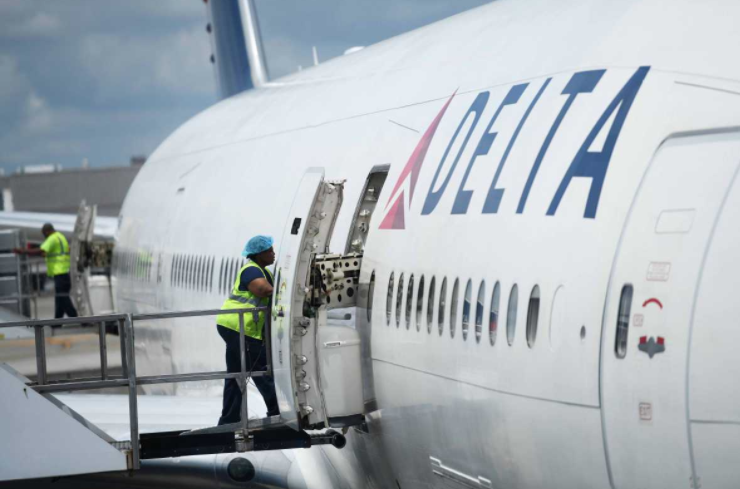Delta to shift flights to new Daxing airport

An airport employee checks the status of a Delta airlines aircraft at the Hartsfield-Jackson Atlanta International Airport in the United States. [Photo/Xinhua]
Delta Air Lines, an Atlanta-based major US carrier, said China is a fast-growing market and an important part of the carrier's globalization. It is continuously investing in upgrading the travel experience and deploying its latest aircraft in the China-US network, and it has not seen any significant fluctuations as a result of the Sino-US trade dispute.
Delta, the airline with the top sales revenue globally, said on Monday that in March 2020, it will move both of its two direct daily flights from Beijing to Detroit and Seattle to the new Beijing Daxing International Airport. Delta's relocation will come along with its partner China Eastern Airlines.
Shanghai-based State-owned China Eastern is expected to move most of its flights, except for the Beijing-Shanghai route, to the Daxing airport in the first quarter of 2020. Back in 2015, Delta invested $450 million to acquire a 3.55 percent stake in China Eastern.
"We look forward to moving to our new home in Beijing. The brand-new Daxing airport will provide us with a great opportunity to better serve the growing needs of our customers in China," said Wong Hong, president of Delta Air Lines for China and Singapore.
Delta said it aims to become the first choice for passengers in the China-US flights market. In the past decade, the company has seen its China-US non-stop flights grow by more than eight times in terms of seat capacity. From 2017 to 2019, the total seats on the China-US flights of Delta increased by more than 20 percent, the company said.
"For the China-US market, we have not seen any significant changes in the booking patterns, but we are always observing the situation. China continues to be an important market for Delta's long-term growth," Wong said.
"Our equity partnership with China Eastern positions us well as the China-US market continues to evolve and expand. We believe a healthy and stable trade relationship between the two nations will benefit the people from both sides, and the business communities," he said.
Delta said sales of most of its China-US flights have remained stable, and the occupancy rate has been more than 80 percent. Currently, Delta operates six daily direct flights between the two countries, with two connecting Beijing and four connecting Shanghai with Detroit, Seattle, Atlanta and Los Angeles. The carrier is also deploying its latest aircraft models in the China-US network, such as B777, A350 and A330-900neo.
Earlier, the China-US flight market had witnessed double-digit annual growth, and in recent years, it has entered a more stable growth period.
Meanwhile, at a time when many domestic carriers have reduced their investment in in-flight catering services, Delta started to upgrade its food and services for economy class passengers on international long-haul flights starting from Nov 1. The new service, a multi-billion dollar investment, features welcome cocktails, hot towels, bistro-style dining and better tableware.
"The shift of consumer preference from goods to services, especially experiential services, continues to grow, particularly in the international travel sector," Wong said.
In addition, Dallas-based American Airlines, which partners with China Southern Airlines, is also expected to move to Daxing airport, but the carrier has not announced specific plans.
Foreign airlines are being encouraged to launch international flights at the new Daxing airport, with an option to operate at Beijing's two airports, according to the Civil Aviation Administration of China.
"The China-US flight market is quite saturated, and it is hard to add new flights. The fundamental demand of passengers traveling between the two countries is there, but we also need to take the China-US relations into consideration," said Lin Zhijie, an aviation industry analyst and columnist at Carnoc, a Chinese civil aviation website.
"If there are any significant changes, it might have bigger impact on visa issuance policies and air travel market demand," he said.

